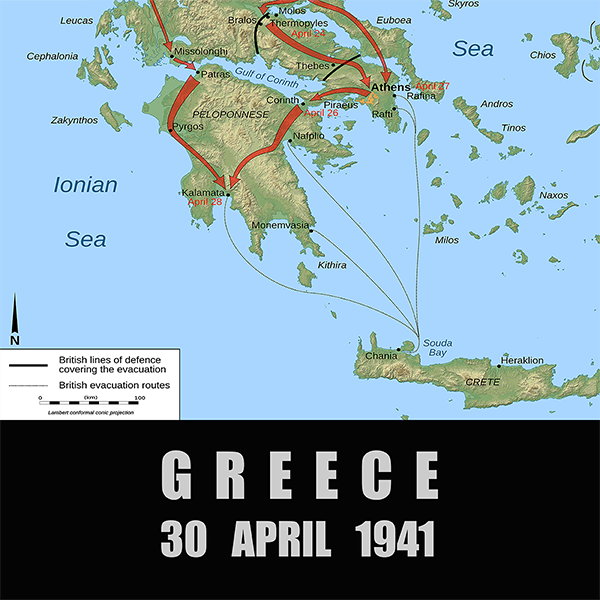Churchill pulled the best of the 8th Army from North Africa
to defend the Greeks from Hitler. The summoned
British force proved to be an expensive gesture that
was easily swept aside. The Germans captured
seven thousand Brits. The remainder of Churchill's
force fled to Crete.
The thirty thousand British troops were just getting
acquainted with their new surroundings when a sky
filled with German paratroopers assaulted them on
the island of Crete. Having recently abandoned their
tanks back in Greece, Britain once again ceded the
battlefield to Germany. Twelve thousand of
Churchill's men became POW's. The rest sailed
through submarine infested waters in order to
reach the Egyptian port of Alexandria.
For Churchill the news of Japan's attack on Pearl Harbor
undoubtedly sounded to him like the bugle call signaling
Uncle Sam was on his way. Too bad Roosevelt would be
chasing after the Japanese. Germany was the real threat.
Four days following Pearl Harbor, Hitler solved Roosevelt's
dilemma and declared war on the U.S.
Washington quickly embraced the European war
as the nation's first priority.
Shocking word came from the tip of the Malay peninsula
where the British island fortress there had surrendered.
With its imposing 15 inch guns pointed out to sea, this
symbol of Britain's rule was considered impregnable.
London's colonial army of 80,000 surrendered to a modest
Japanese force of 30,000. Turns out English troops were
no match for men trained in jungle fighting.
Singapore's defenders assumed the threat
would come by sea and chose to ignore the
possibility of an invasion over land.
Japan called the shots in the Pacific until Midway.
The US Navy took advantage of breaking Japan's
military code to ambush Tokyo's national pride -
their world class carrier fleet. All four Japanese
carriers sank into the ocean's depth while
the Yorktown was America's only loss.
With Japan's defeat, Churchill no longer saw Tokyo
as a serious threat to his Commonwealth members
of India and Australia.
The loss of Tobruk was too much.
So here we were. The 8th Army, with its
back to the wall, fighting for all the marbles
near this small railway depot isolated in the
Sahara desert.
A no confidence vote against Churchill was the
talk among members of the House of Commons.
All this erupted as the Prime Minister plotted
global strategy with his most important ally,
President Roosevelt.
* * * * *
OVER EASY








No comments:
Post a Comment